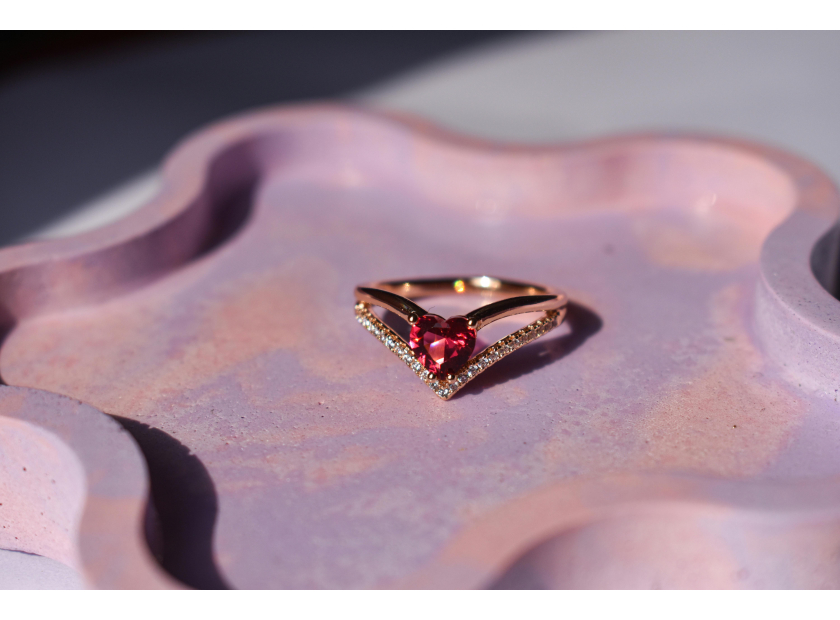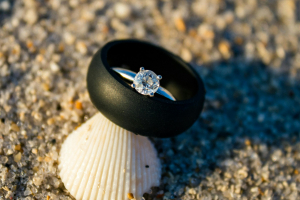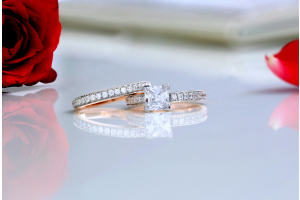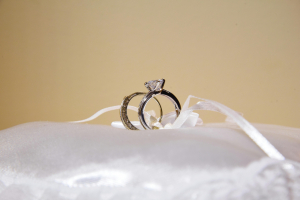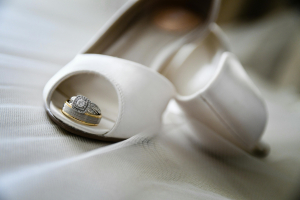GBP
/
GBP
/
Shipping to:
Currency:
When it comes to engagement rings, more couples are opting for something unique, personal, and often more affordable than the traditional diamond.
Alternative stones are gaining popularity, offering a stunning range of colours, meanings, and price points.
Whether you’re drawn to the deep blue of a sapphire, the vibrant green of an emerald, or the sparkle of moissanite, there’s an alternative gemstone out there to suit every taste and lifestyle.
Here’s a guide to help you choose the perfect engagement ring with an alternative stone.
Why Choose an Engagement Ring with an Alternative Stone?
Choosing an engagement ring with an alternative stone allows you to stand out from the crowd and add a personal touch to your symbol of love.
Here’s why many people are choosing gemstones other than diamonds:
Standing Out from the Crowd
Diamonds are beautiful, but they’re also the most common choice for engagement rings.
If you prefer a ring that’s more distinctive, an alternative stone can be a wonderful way to express your individuality.
Different gemstones come in an array of colours, allowing you to choose one that reflects your personality or has special significance for you.
For a wide selection of unique options, check out fancy coloured diamonds, which offer stunning hues beyond traditional choices.
Personal Significance and Symbolism
Many gemstones have meanings and symbolism associated with them.
For example, sapphires have long been considered a symbol of wisdom and royalty, while emeralds are associated with renewal and hope.
Choosing a stone that carries personal or cultural significance can add a deeper meaning to your engagement ring, making it not just a piece of jewellery but a truly special token of your relationship.
If you’re interested in lab-grown options with symbolic value, explore lab-grown fancy coloured diamonds for eco-friendly and ethically sourced choices.
Cost Considerations
For those looking for a more affordable option, alternative stones can provide excellent value for money.
While high-quality diamonds can be quite costly, many other gemstones offer stunning beauty at a fraction of the price.
This doesn’t mean sacrificing quality; you can still find exceptional stones that look and feel luxurious.
Popular Alternative Stones for Engagement Rings
There’s a wide variety of gemstones to choose from when it comes to alternative engagement rings.
Here’s a look at some of the most popular choices and what makes them special.
Sapphire: A Classic and Elegant Choice
Sapphires are a popular choice for those who love rich, deep colours.
Known for their durability, they’re second only to diamonds on the Mohs hardness scale, making them a great option for daily wear.
While blue sapphires are the most famous, these gems actually come in many colours, including pink, yellow, and green, giving you plenty of options to match your style.
Emerald: Vibrant and Timeless
Emeralds are cherished for their vivid green hue and timeless appeal.
They’ve been favoured throughout history by royalty and are often seen as a symbol of renewal.
While they’re not as hard as diamonds, they’re still suitable for engagement rings if set with care.
It’s worth noting that emeralds typically contain inclusions, which are natural imperfections that can give the stone its character and charm.
To find a variety of shapes and sizes, you might want to search for emerald-cut lab-grown diamonds.
Ruby: The Symbol of Passion and Love
Rubies, with their captivating red tones, have long been associated with love and passion.
Like sapphires, they belong to the corundum family, making them incredibly durable.
Rubies range from deep red to pinkish-red hues, providing a stunning alternative to the traditional engagement ring.
Morganite: The Blush Pink Gemstone
Morganite is known for its delicate blush pink colour, which has a romantic and feminine appeal.
It’s become increasingly popular as a choice for modern engagement rings, especially when paired with rose gold settings.
While not as hard as diamonds, morganite is still durable enough for everyday wear, provided you take care of it.
Moissanite: The Diamond Alternative
If you love the look of diamonds but want something different, moissanite is a fantastic choice.
It’s a lab-created gemstone that closely resembles a diamond, with even more fire and brilliance.
Moissanite is also more affordable than diamonds, making it an attractive option for those seeking a budget-friendly yet dazzling ring.
For a diamond-like shape with a twist, consider options such as a cushion-cut lab-grown diamond for a similar aesthetic.
Opal: Unique and Dazzling Patterns
Opals are known for their enchanting play of colour, with each stone displaying a unique combination of hues.
No two opals are exactly alike, making them an excellent choice for someone who wants a truly one-of-a-kind ring.
However, opals are softer than other gemstones, so they may require extra care and a protective setting.
Aquamarine, Amethyst, and Other Semi-Precious Stones
Other semi-precious gemstones, such as aquamarine and amethyst, can also make beautiful engagement rings.
Aquamarine’s serene blue tones are perfect for those who love cool colours, while amethyst offers a rich purple hue.
These stones are more affordable than diamonds and come in various shades and qualities.
Factors to Consider When Choosing an Alternative Stone
Choosing the right stone involves more than just picking a colour you like.
Here are some factors to keep in mind to ensure your ring is as beautiful and durable as possible.
Durability and Hardness
The Mohs hardness scale measures a gemstone's resistance to scratching.
While diamonds score a perfect 10, other stones can still be durable enough for everyday wear.
Sapphires and rubies, for instance, score a 9, making them a strong choice.
Stones like morganite or opal, which score lower on the scale, may need more delicate care and protective settings.
Colour and Clarity
The colour of a gemstone is often its most striking feature, but clarity can also play a role in its appearance and value.
Some stones, like emeralds, typically have natural inclusions, while others, such as sapphires, can be found in clearer varieties.
It’s essential to choose a stone with a colour and clarity combination that appeals to you.
If you prefer classic shapes, explore options such as a round-cut lab-grown diamond for a timeless look.
Setting Style
The setting not only affects the appearance of the ring but also protects the stone.
For softer gemstones, a bezel setting, which surrounds the stone, may be a better choice to provide extra protection.
Prong settings can work well for harder stones like sapphires or rubies, showcasing their brilliance while keeping them secure.
Ethical and Sustainable Sourcing
Many people now consider the ethical implications of their purchases, including engagement rings.
Choosing a gemstone that’s ethically sourced or lab-grown can help ensure your ring is a responsible choice.
Lab-grown sapphires, rubies, and even emeralds are available, providing the same beauty as natural stones with a smaller environmental footprint.
Pros and Cons of Alternative Stones
Advantages of Choosing Alternative Stones
- Affordability: Many alternative stones are more budget-friendly than diamonds.
- Unique Appearance: They offer distinctive colours and patterns, allowing you to create a truly unique ring.
- Ethical Considerations: Some stones, especially lab-grown options, provide a more sustainable choice.
Potential Drawbacks to Be Aware Of
- Durability Concerns: Some stones aren’t as hard as diamonds and may require extra care.
- Limited Availability: It can sometimes be more challenging to find certain gemstones in specific cuts or sizes.
How to Choose the Right Alternative Stone for Your Engagement Ring
Finding the perfect stone is about matching it to your lifestyle, style preferences, and values.
Consider Your Lifestyle
If you lead a very active lifestyle, a harder gemstone like a sapphire or ruby may be a better choice.
Softer stones like opal may require extra care to avoid damage.
Think About Personal Style Preferences
Whether you prefer subtle and understated or bold and vibrant, there’s a gemstone that will suit your style.
Consider which colours you’re naturally drawn to and how they complement your everyday look.
Consult with a Trusted Jeweller
It’s important to work with a reputable jeweller who has experience with alternative stones.
They can help guide you through the process, ensuring you choose a quality stone and suitable setting.
Customising Engagement Rings with Alternative Stones
A custom-designed engagement ring can be a fantastic way to make your ring even more special.
Designing a Bespoke Ring
Many jewellers offer bespoke services, allowing you to choose the gemstone, setting, and metal to create a ring that’s truly one-of-a-kind.
Adding Accent Stones
Incorporating accent stones can enhance the look of the ring.
Diamonds or smaller gemstones can be used to complement the main stone, adding extra sparkle and interest.
Choosing Metal Types for the Setting
The metal you choose can affect the overall appearance of the ring.
For example, rose gold beautifully complements warm-toned stones like morganite, while platinum or white gold can enhance the cool tones of sapphires or aquamarine.
Care and Maintenance of Engagement Rings with Alternative Stones
To keep your ring looking its best, proper care is essential.
General Tips for Cleaning and Storage
Most gemstones can be cleaned with warm, soapy water and a soft brush.
Avoid using harsh chemicals or ultrasonic cleaners, which may damage certain stones.
When not wearing your ring, store it in a jewellery box or pouch to protect it from scratches.
Specific Care Requirements for Different Stones
Some stones, like opals, are more delicate and may need special care.
Emeralds, being porous, should be protected from exposure to extreme temperatures and chemicals.
Where to Buy Engagement Rings with Alternative Stones
It’s crucial to buy from a reputable jeweller to ensure you get a high-quality stone.
Reputable Jewellers and Online Retailers
Look for jewellers who specialise in alternative gemstones and have good reviews.
Ensure they provide certification and details about the stone’s origin, especially if you’re concerned about ethical sourcing.
Custom Jewellery Designers
Bespoke jewellers can offer tailored guidance and design services, helping you create a truly unique engagement ring.
FAQs
Are alternative stones suitable for everyday wear?
Yes, but it depends on the stone.
Harder stones like sapphires and rubies are ideal for daily wear, while softer stones like opals may need more careful handling.
How do I clean an engagement ring with an alternative stone?
Most stones can be cleaned with warm water, mild soap, and a soft brush.
Avoid harsh cleaners that could damage the stone.
Are lab-grown gemstones a good option?
Lab-grown gemstones are an ethical and cost-effective choice, offering the same beauty as natural stones but with a smaller environmental impact.
Can I add diamonds to a ring with an alternative stone?
Yes, adding diamond accents can complement the main gemstone and add extra sparkle.
How can I ensure the stone is ethically sourced?
Buy from reputable jewellers who can provide certification and information about the stone’s sourcing.


